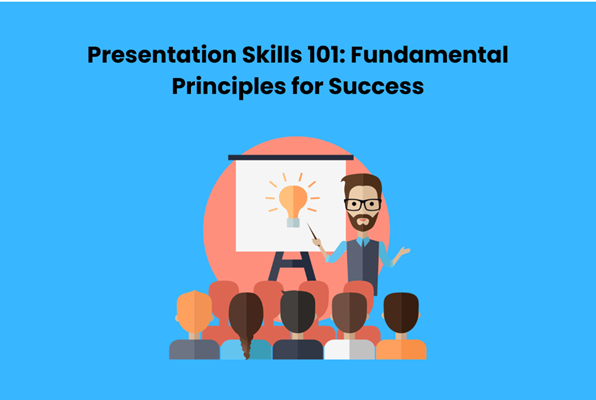Effective presentation skills are essential for anyone who wants to convey ideas, influence decisions, and make an impact. Whether you’re speaking in front of a large audience or presenting to a small group, mastering the art of public speaking can elevate your professional and personal endeavors.
In this blog, we’ll explore What is Presentation Skills and some fundamental principles of Presentation Skills that can help you become a more confident and persuasive speaker.
Table of Contents
- Know Your Audience
- Structure Your Content
- Engage Your Audience
- Practice, Practice, Practice
- Use Visual Aids Wisely
- Manage Nervousness
- Seek Feedback and Learn from Experience
- Embrace Authenticity
- Continuous Improvement
- Conclusion
Know Your Audience
Delivering an effective presentation starts with knowing your audience. Take into account their experience, passions, and expertise in the area. Make your message more relevant and interesting by adjusting the content and delivery method to appeal to your target demographic. Be it stakeholders, customers, or coworkers, understanding your audience will enable you to engage with them more deeply.
Structure Your Content
It is simpler for your audience to follow and comprehend a well-structured presentation. Start your presentation with a concise opening that summarises the key ideas you will cover and explains its purpose. Use titles and transitions to help your audience navigate your presentation as you arrange your material into logical parts. Finish on a high note that captures the essence of your argument and makes an impact.
Engage Your Audience
Keeping your audience interested and paying attention requires engagement. Include interactive features, humour, or narrative to add interest to your presentation. Bring up questions, promote involvement, and include your audience in the conversation. This keeps people interested and makes the encounter more significant and unforgettable.
Practice, Practice, Practice
You’ll become more polished and self-assured the more you practise your presentation. Practise your delivery many times, focusing on your body language, tempo, and vocal tone. To pinpoint your areas for growth, practise in front of a mirror or videotape yourself. Seeking input from mentors or coworkers might help you get insightful opinions.
Use Visual Aids Wisely
Slides, movies, or props are visual aids that may improve your presentation and support your main points. But it’s crucial to utilise them sensibly and avoid becoming too dependent on them. Use your visual aids to support, not detract from, your spoken remarks. Keep them straightforward and uncomplicated. Make sure they are clear to see and comprehend from any angle in the space.
Manage Nervousness
Although being anxious before a presentation is normal, controlling your anxiety is crucial to giving a polished presentation. Before you talk, try relaxation exercises to help you de-stress, including deep breathing or visualisation. Instead of concentrating on your nervousness, think about your audience and the message you want to deliver. Recall that anxiety is often seen as excitement, so accept it as an indication that you are invested in your presentation.
Seek Feedback and Learn from Experience
Ask your audience or other coworkers for comments after your presentation. Request detailed input on things like delivery, engagement, and clarity. Use this input to pinpoint your presentation’s strong points and areas for development, then apply it to subsequent ones. Over time, you’ll improve your presenting abilities and become a more polished speaker by drawing lessons from each event.
Embrace Authenticity
Being real is essential to building a relationship of trust with your audience. In your presentation, be yourself and allow your personality to come through. Sharing personal tales or experiences relevant to your subject may establish a more intimate connection with your audience. Authenticity increases credibility and trust, amplifying your message’s impact and recall. Adopting authenticity also makes you feel more at ease and self-assured, which calms anxieties and improves your performance in general.
Continuous Improvement
Just like any other talent, presentation abilities may be developed with time. Adopt a mentality that emphasises ongoing development and look for chances to improve your presentation skills. Enrol in training sessions for presenting skills, seminars, or workshops to learn fresh perspectives and methods. Remain receptive to criticism and be prepared to modify and advance your strategy in light of new information. You can remain on top of trends and provide more memorable presentations that connect with your audience by always working to improve your presenting abilities.
Conclusion
Gaining presentation proficiency is an invaluable skill that will help you in both your personal and professional life. You may develop into a more certain and convincing speaker by knowing your audience, organising your material, including them, rehearsing often, using visual aids, controlling your anxiety, getting feedback, and learning from mistakes. Using these core ideas will enable you to provide presentations that educate, motivate, and persuade audiences, whether you’re giving them in a conference room, boardroom, or classroom.
